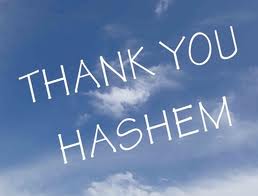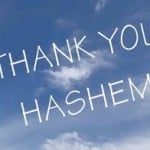It can be very disconcerting to spend too much time listening to all the nervous chatter and handwringing regarding the state of our people in this land. “What will be with Hezbollah and their tunnels?” “What do we do with Isis on our northern border?” “Where is our economy heading and what does the world think of us?” etc. etc.
All those questions are in of themselves, important and pertinent. Yet they are so micro focused , bereft of broad vision that as a result one can easily miss the total picture. One gets the impression that we as a people are not comfortable with success. Success has been such a foreign concept for us throughout our long and difficult exile. In fact the Torah portion of” Ki Tavo” describes ninety eight curses that can befall the people of Israel “because you did not serve HaShem, your God, with happiness and with gladness of heart, when you had an most of everything ( Rov Kol) (Deuteronomy 28:47). We have fallen into the trap of assuming that true happiness only occurs when you have everything and not most of everything ( Rov Kol)
As a result we have especially not yet realized that our two thousand year old exile is hurling forward towards its completion. It is out of that insecurity that we find ourselves returning to that internal familial bickering that so characterizes a family under pressure. We find ourselves returning to the old patterns of name calling and accusations that bespeak a deep inner sense of fear and insecurity.
What is missing is a deep awareness of Hashem’s promise that this land is a “a land that Hashem your G-d cares for. The eyes of Hashem your G-d are always upon it, from the beginning of the year to the end of the year. ( Deuteronomy 11:12)
Turnuing again to the words of the Torah portion of Ki Tavo can be very helpful in recovering that awareness,
1. And it will be ( VeHaya) , when you come into the land which Hashem your G-d, gives you for an inheritance, and you possess it and settle in it, 2. that you shall take of the first of all the fruit of the ground, which you will bring from your land, which Hashem your G-d, is giving you. And you shall put [them] into a basket and go to the place which Hashem your G-d, will choose to have His Name dwell there…. 8. And Hashem brought us out from Egypt with a strong hand and with an outstretched arm, with great awe, and with signs and wonders. 9. And He brought us to this place, and He gave us this land, a land flowing with milk and honey.( Deuteronomy 26:1-9)
We are told by the Midrash Rabba that “ VeHaya” is a code word for joyful expectation. .”Rabbi Shmuel Bar Nachman came and declared, ‘In any place where it says “And it came to pass” (VaYehi ) “ it signals distress; and times of great danger and difficulty. We see that concept in the first words in the Book of Esther:
“Now it came to pass ( VaYehi) in the days of Ahashverush..” (Esther1;1)
On the other hand the Midrash teaches that when it says “And it shall be (VeHaya) ” it signals a time of rejoicing.'”
Rav Zvi Yehudah Kook z”tl explains the Midrash Rabba’s statements further regarding the use of these code-words (VeHaya and VaYehi) .Based on Hebrew grammar rules, whenever the letter “Vav” (which means ‘and”) is placed before a verb that is in the past tense, it transforms the verb into the future tense ( and vice versa). This “Vav” is called the Vav Hahippuch or the “reversing vav” .
Rav Zvi Yehudah Kook explains that the word “And it shall be (vehaya)” is made up of the verb “Haya” which is in the past tense ( it was) and the vav at the beginning of the word which transforms it to the future tense.
The opposite occurs with the verb “ Yehi” which translates as “ It will be” . With the addition of the Vav HaHippuch the verb transforms into the past tense (and it was).
Rav Tzvi Yehudah goes on to explain that our past and our future are intricately connected. Yet the way that connection is made, greatly affects our present sense of being.
There are those who are imprisoned by the difficult journey of the past and have taken their vision of destiny and have diminished it. They have taken the future and have cast it into the past. That is the sadness of “VaYehi”.( Esther 1:1, Ruth 1:1)
On the other hand, there are others who have looked back on their difficult journey and have overcome its despair and pain and have harnessed it into the future. They have taken their past and have retransformed it in light of their future sense of destiny. That is the joy expressed by the word “VeHaya.”
As a people the Jewish nation has been on a long and arduous journey. They have been persecuted, maligned and massacred. In truth that hatred has not yet diminished in the world.
Yet like dried our skeletons who were revived we have gathered and recreated our ancestral home. ( Ezekiel 37:4). Like doves on clouds we have returned to our ancient homes ( Isaiah 60:8). The fruits are blossoming on the trees and the grapes on the vines again after thousands of years of desolation”(Ezekiel 36)
All these miracles are occurring around us and yet we are stymied by the challenges of the present.
We are in the midst of the reading of the seven Haftarot of consolation. Rabbi David Abudraham, who lived in the 14th century teaches that these seven Haftarot mirror the difficult process of renewal that our people are undergoing in our days. Reading those Haftarot sequentially, we read of a difficult give and take between Hashem and His people who are unable to be consoled .
It is only at the end that they are finally comforted and declare “ I will greatly rejoice in Hashem, my soul shall be joyful in my G-d; for He hath clothed me with the garments of salvation”( Isaiah 61:10).
To attain that level of awareness we need to heed the lesson of VeHaya. We need to take our past and transform it in light of our future sense of destiny. That is the source of true Joy. With such an awareness we would not fall into the fears and petty recriminations that sweep over us. With such an awareness , the tunnels, Isis or the European Union cannot and will not deflect us on our path towards Destiny.
Lerefuat Yehudit bat Golda Yocheved

